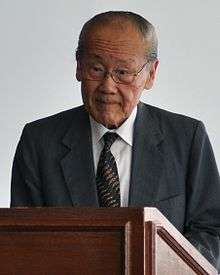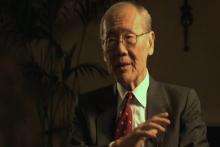Wang Gungwu
| Wang Gungwu | |
|---|---|
 Wang Gungwu speaking at an event in 2010 | |
| Born |
9 October 1930 Surabaya, Dutch East Indies (now Indonesia) |
| Institutions |
University of Malaya Australian National University University of Hong Kong National University of Singapore |
| Alma mater |
University of Malaya School of Oriental and African Studies |
| Doctoral advisor | Denis C. Twitchett |
| Doctoral students | James K. Chin, Antonia Finnane, John Fitzgerald, Huang Jianli, Lee Guan Kin, Ng Chin-Keong, Billy K. L. So |
| Known for | Vice-Chancellor of the University of Hong Kong, University Professor of the National University of Singapore, Doyen of Overseas Chinese historical scholarship |
Wang Gungwu, CBE (simplified Chinese: 王赓武; traditional Chinese: 王賡武; pinyin: Wáng Gēng Wǔ; born 9 October 1930)[1] is a prominent Australian historian of Asia.[2] He has studied and written about the Chinese diaspora, but he has objected to the use of the word diaspora to describe the migration of Chinese from China because both it mistakenly implies that all Overseas Chinese are the same and has been used to perpetuate fears of a "Chinese threat", under the control of the Chinese government.[3]
Background
Wang was born in Surabaya, Indonesia and grew up in Ipoh, Malaysia. He completed his secondary education in Anderson School (ms), an English medium school in Ipoh.
Wang studied history in the University of Malaya, Malaysia, where he received both his bachelor's and master's degrees. He holds a PhD from the School of Oriental and African Studies, University of London (1957) for his thesis The structure of power in North China during the Five Dynasties. He taught at the University of Malaya (in both Singapore and Kuala Lumpur), and went to Canberra in 1968 to become the Professor of Far Eastern History in the Research School of Pacific and Asian Studies (RSPAS) at Australian National University. Before going to Canberra, he lend support to the formation of the Malaysian party Gerakan as one of the founders, although he was not personally involved in the party's activity.[4] He was Vice-Chancellor of the University of Hong Kong from 1986 to 1995. In 2007, Wang became the third person to be named University Professor by the National University of Singapore.[5]
In 1994, Wang was awarded the Academic Prize of the Fukuoka Asian Culture Prize by the Japanese city of Fukuoka.[2]
Positions held
Wang is University Professor at the National University of Singapore, and also Chairman of the Managing Board of the Lee Kuan Yew School of Public Policy. He is the Chairman of the East Asian Institute.[6] Wang was a Distinguished Professorial Fellow at the Institute of Southeast Asian Studies where he is now chairman of the board of Trustees. He is also an Emeritus Professor of the Australian National University, Canberra.
Selected publications
Books
Wang Gungwu (2014). Another China Cycle: Committing to Reform. World Scientific.
Wang Gungwu and Zheng Yongnian, ed. (2012). China: Development and Governance. World Scientific.
Lixiang bietu: jingwai kanzhonghua 离乡别土:境外看中华(China and Its Cultures: From the Periphery). The Fu Ssu-nien Memorial Lectures 2005. Taipei: Institute of History and Philology, Academia Sinica, 2007. 86 pages.
Chuka Bunmei to Chugoku no yukue 中华文明と中国のゆくえ (Chinese Civilization and China’s Position).The Ishizaka Lectures 2005. Translated into Japanese by Kato Mikio. Tokyo: Iwanami Shoten, 2007. 181 pages.
Interpreting China's Development. (ed. with John Wong). World Scientific, 2007.
Divided China: Preparing for Reunification, 883–947. World Scientific, 2007.
Nation-building: Five Southeast Asian Histories. (Editor). Singapore: Institute of Southeast Asian Studies, 2005.
Rising China and Its Immigrant, The. World Scientific. 2005.
Yimin ji xingqi de zhongguo 移民及兴起的中国 (Essays on Migrants and China’s Rise). World Scientific, 2005.
Diasporic Chinese Ventures: The Life and Work of Wang Gungwu. Edited by Gregor Benton and Liu Hong. London: Routledge, 2004.
Maritime China in Transition, 1750–1850. (Editor, with Ng Chin-keong). Wiesbaden: Harrassowitz Verlag, 2004, 397 pages.
Anglo-Chinese Encounters since 1800: war, trade, science and governance. Cambridge: Cambridge University Press, 2003.
Iraq War and Its Consequences, the: Thoughts of Nobel Peace Laureates and Eminent Scholars (ed. with Irwin Abrams). World Scientific. 2003.
Sino-Asiatica: Papers dedicated to Professor Liu Ts’un-yan on the occasion of his eighty-fifth birthday. (Editor, with Rafe de Crespigny and Igor de Rachewiltz). Canberra: Faculty of Asian Studies, ANU. 2003.
Damage Control: The Chinese Communist Party in the Jiang Zemin Era (ed. with Zheng Yongnian). Singapore: Eastern Universities Press, 2003.
Ideas Won’t Keep: the struggle for China’s future. Singapore: Eastern Universities Press, 2003.
Bind Us in Time: Nation and Civilisation in Asia. Singapore: Eastern Universities Press, 2003.
To Act is to Know: Chinese Dilemmas. Singapore: Eastern Universities Press, 2003.
Don’t Leave Home: Migration and the Chinese. Singapore: Eastern Universities Press, 2003.
Only Connect! Sino-Malay Encounters. Singapore: Eastern Universities Press, 2003.
The Chinese Overseas: From Earthbound China to the Quest for Autonomy (2002 ISBN 9780674009868) The 1997 Edwin O. Reischauer Lectures, Harvard University.
Reform, Legitimacy and Dilemmas: China's Politics and Society. (ed. with Zheng Yongnian). World Scientific. 2001.
Joining the Modern World: Inside and Outside China. World Scientific. 2000.
China: Two Decades of Reform and Change. (ed. with John Wong). World Scientific. 1999.
China and Southeast Asia: Myths, Threats, and Culture. World Scientific. 1999.
China's Political Economy. (ed. with John Wong). World Scientific. 1998.
Articles and papers
“Family and Friends: China in Changing Asia”. In Anthony Reid and Zheng Yangwen (eds.) Negotiating Asymmetry: China’s Place in Asia. Singapore: NUS Press, 2009, pp. 214–231.
“越洋寻求空间:中国的移民”,华人研究国际学报, International Journal of Diasporic Chinese Studies, vol. 1, no. 1, 2009, pp. 1–49.
“Southeast Asia: Imperial themes”, New Zealand Journal of Asian Studies, June 2009, pp. 36–48.
“The China Seas: Becoming an Enlarged Mediterranean”, In Angela Schottenhammer (Ed.), The East Asian ‘Mediterranean’: Maritime Crossroads of Culture, Commerce and Human Migration. Wiesbaden: Harrassowitz Verlag. 2008, pp. 7–22.
“Flag, Flame and Embers: Diaspora Cultures”. In Kam Louie (Ed.), The Cambridge Companion to Modern Chinese Cultures. Cambridge: Cambridge University Press, 2008, pp. 115–134.
“China and the International Order: Some Historical Perspectives”. In Wang Gungwu and Zheng Yongnian (Eds), China and the New International Order. London: Routledge, 2008, pp. 21–31.
“India and Indians in East Asia: an Overview”, In K. Kesavapany, A. Mani, P. Ramasamy (eds.), Rising India and Indian Communities in East Asia. Singapore: Institute of Southeast Asian Studies, 2008, pp. 3–11.
“The Rise of China: History as Policy”. In Ron Huisken and Meredith Thatcher (Eds.) History as Policy:Framing the Debate on the Future of Australia, Canberra Papers of Strategy and Defence, ANU E Press, 2008.
“南侨求学记:不同的时代,走不同的路, Nanqiao qiuxueji: butongde shidai, zou butongde lu”. In 李元瑾 (主编),跨越疆界与文化调适。Lee Guan Kin (ed.), Crossing Borders and Cultural Adjustments. 新加坡南洋理工大学中华语言文化中心, 和八方文化创室,Singapore: NTU Centre for Chinese Language and Culture, and World Scientific, 2008, pp. 13–28.
“内与外的解析- 论海外华人作家”,世界华侨华人研究 Overseas Chinese Studies. 第一辑,2008, pp. 1–10.
“The First Decade: Historical Perspectives”. In The First Decade: The Hong Kong SAR in Retrospective and Introspective Perspectives. Edited by Yeung Yue-man. Hong Kong: The Chinese University Press, 2007, pp. 3–21.
“Trading Order and Polity Structures in Asia”. In The Inclusive Regionalist: A Festschrift dedicated to Jusuf Wanandi. Edited by Hadi Soesastro and Clara Joewono. Jakarta: Centre for Strategic and International Studies (CSIS), 2007, pp. 83–90.
“The Great Powers in Asia: a View from Singapore”, Strategy: Global Forces 2007 Proceedings, vol. 2. Canberra: Australian Strategic Policy Institute, December 2007, pp. 1–8.
“Liuxue 留学 and yimin 移民: From Study to Migranthood”. In Mette Thuno (ed.), Beyond Chinatown: New Chinese Migration and the Global Expansion of China. Copenhagen: NIAS Press, 2007.
“Mixing Memory and Desire: Tracking the Migrant Cycles”. In Chinese Overseas: Migration, Research and Documentation. Edited by Tan Chee-Beng, Colin Storey and Julia Zimmerman. Hong Kong: Chinese University Press, 2007, pp. 3–22.
“Rethinking Chinese History in a global Age: an Interview with Wang Gungwu” by Alan Baumler, The Chinese Historical Review, vol. 14, no. 1, Spring 2007, pp. 97–113.
“In Conversation with Wang Gungwu” by Vineeta Sinha, ISA E-Bulletin, no. 6, March 2007, pp. 54–80.
“Zouxiang xinde xiandaixing: xianggang huigui de lishi shijiao (走向新的现代性:香港回归的历史视角,Towards New Modernity: The Return of Hong Kong from a Historical Perspective)”, 二十一世纪(Twenty-First Century), no. 101, June 2007, pp. 4–12.
“Inception, Origins, Contemplations: a Personal Perspective”. In Imagination, Openness & Courage: The National University of Singapore at 100. Singapore: National University of Singapore, 2006, pp. 1–31.
“Lishi yu zhishi: zhongxi fenlei de chayi (历史与知识:中西分类的差异, History and Knowledge: different library classifications in China and the West)”. In Pan Mingxin (editor), Nanshan lunxueji: Qian Cunxun xiansheng jiuwu shengri jinian (南山论学集:钱存训先生九五生日纪念). Beijing: National Library, 2006, pp. 24–30.
“China and Southeast Asia”. In David Shambaugh (ed.) Power Shift: China and Asia’s New Dynamics. Berkeley: University of California Press, 2005.
“Within and Without: Chinese Writers Overseas”, Journal of Chinese Overseas, vol. 1, no. 1 (May 2005), pp. 1–15.
“Two Perspectives of Southeast Asian Studies: Singapore and China”. In Henk Schulte Nordholt, Remco Rabin and Paul Kratoska (eds.), Discovering Southeast Asia: Genealogies, Concepts, Comparisons, and Prospects. Singapore and Athens, OH: Singapore University Press and Ohio University Press, 2005, pp. 60–81.
“Maritime China in Transition”. In Ng Chin Keong and Wang Gungwu (eds.) Maritime China and Overseas Chinese Communities in Transition, 1750–1850. Wiesbaden: Harrassowitz Verlag, 2005. pp. 3–16.
“The Age of New Paradigms” (Keynote Lecture, 18th Conference of International Association of Historians of Asia, December 2004), Yatai yanjiu luntan (Asia-Pacific Forum), no. 26, 2004, pp. 1–15.
“China’s Long Road to Sovereignty”. In G. Doeker-Mach and K.A. Ziegert (eds.) Law, Legal Culture and Politics in the Twentieth First Century. Stuttgart: Franz Steiner Verlag, 2004, pp. 453–464.
“The Cultural Implications of the Rise of China for the Region”. In Kokubun Ryosei and Wang Jisi (eds.), The Rise of China and a Changing East Asian Order. Tokyo and New York: Japan Center for International Exchange, 2004. pp. 77–87.
"Confucianism", in Frank-Jürgen Richter, Pamela Mar: Asia’s New Crisis, John Wiley & Sons, Singapore, 2004 (see Amazon)
“Secular China" (Giri Deshingkar Memorial Lecture), China Report, 2003, vol. 39, no. 3, July–September 2003, pp. 305–321.
“Social Bonding and Freedom: Problems of Choice in Immigrant Societies”. In Michael Charney and Brenda Yeoh (eds.), Asian Migrants and Education in Immigrant Societies. Boston: Kluwer Academic, 2003, pp. 1–13.
“The Limits of Decolonization”. In Marc Frey, Ronald W. Preussen and Tan Tay Yong (eds.), The Transformation of Southeast Asia: International Perspectives on Decolonization. Armonk, N.Y.: M.E. Sharpe, 2003, pp. 268–273.
“Chinese Political Culture and Scholarship about the Malay World”. In Ding Choo Ming. (ed.). Chinese Studies of the Malay World: a revaluation of a scholarly tradition. Singapore: Eastern Universities Press, 2003, pp. 12–30.
“Reflections on Networks and Structures in Asia”. In Melissa G. Curley and Liu Hong (eds), China and Southeast Asia: changing social-cultural interactions. Hong Kong: Hong Kong University Centre of Asian Studies, 2003, pp. 13–26.
Additional media

Wang discussed the demise of the Qing dynasty in China's Century of Humiliation.
References
| Library resources about Wang Gungwu |
| By Wang Gungwu |
|---|
- ↑ WANG, Gungwu International Who's Who. accessed 1 September 2006.
- 1 2 "Wang Gungwu". Fukuoka Prize. 1994. Retrieved 12 May 2014.
- ↑ "Asian Affairs interview with Wang Gungwu". Retrieved 16 May 2006.
- ↑ Billy K.L. So, John Fitzgerald, Jianli Huang, James K. Chin (1 March 2003). Power and Identity in the Chinese World Order: Festschrift in Honour of Professor Wang Gungwu. Hong Kong University Press. p. 389. ISBN 978-9622095908.
- ↑ http://www.dso.org.sg/news_details.aspx?news_sid=20090320548643799626
- ↑ "NUS East Asian Institute, Chairman profile". Archived from the original on 27 May 2008. Retrieved 15 August 2008.
- ↑ http://www.eai.nus.edu.sg/wgw.pdf
Further reading
- So, Billy K.L.; Fitzgerald, John; Huang, Jianli; Chin, James K. (2003). Power and Identity in the Chinese World Order: Festschrift in Honour of Professor Wang Gungwu (illustrated ed.). Hong Kong University Press. ISBN 9622095909. Retrieved 24 April 2014.